John DiBello returns with a lesson you never got in history or literature class!
—
UPDATED 3/15/23: Beware the Ides of March! No, really, beware! Because you really don’t know what could happen! Ach, OK. Maybe it’s not that serious. Maybe it’s just time to check out John DiBello’s hilarious piece that first ran back in 2015. Because, y’know, it’s timeless. Just like the story of Julius Caesar. Dig it. — Dan
—
By JOHN DiBELLO
Beware the Ides of March! To which mighty Julius Caesar, Grand Poo-Bah of the Holy Roman Empire, asked: “What, by Jupiter, is an Ide?” Answer: it’s the middle of the month, or more specifically, March 15th — the day that Caesar got stabbed in the senate. Which, I think we can all agree, is a very painful place to be stabbed.
You could read about the life of Julius and his emperorin’ family in Suetonius’ classic Roman history text The Twelve Caesars, but why settle for merely twelve when 13th Dimension can give you a baker’s dozen of Caesars? So in honor of the I. of M., let’s pop in on Julie ‘n’ pals through the noblest medium of them all: comic books!
—
1. Live from Caesar’s Palace (Classics Illustrated)
You can get a fairly straightforward view of historical Caesar in comics books written by William Shakespeare, the Bard of Avon himself, before he broke his contract with a young Stan Lee and headed to work on the legitimate stage.
Classics Illustrated presented several popular Shakespeare plays in easy-to-swallow comic form, including that great tragedy of Roman times, Julius Caesar. The play itself infamously features a clock ringing the hour, hundreds of years before the invention of true mechanical timepieces. After spotting this error, so many readers wrote into the Classics Illustrated office demanding a No-Prize that the company eventually went out of business in 1971 for completely unrelated reasons.
Another Classics Illustrated issue, Caesar’s Conquests, was based on the memoirs of Julius himself and featured his military victories over much of Europe, a campaign of which many players of the board game Risk would be envious. Julius Caesar himself is to be commended for his exceptional foresight in making certain his book contract had a comics adaptation clause. To this day his descendants, Bob and Sylvia Caesar of Fort Wayne, Indiana, receive an annual royalty check of 27¢ for this comic book.
—
2. Mad About Caesar (MAD #17)
Not every comics treatment of Caesar was so reverent or complimentary. The great artist Wally Wood gave the satirical treatment to the character in an early issue of MAD, chock-full of so much humorous detail that this scan doesn’t do credit to it.
The story not only pokes the usual MAD-style fun at the subject but also deconstructs it, becoming into a lesson on adapting a famous story for a new medium, until it devolves into a surrealist free-for-all. The over-the-top violence is beautifully designed and all in good fun, unless of course your name is Dr. Frederick Wertham.
—
3. Peabody Award-Winning Caesar (Four Color #1152)
A gentler parody of Caesar was featured in a time-traveling story starring genius inventor dog Mr. Peabody (and his boy, Sherman) from Jay Ward’s Rocky & Bullwinkle Show. The set-up and progression of each Mr. Peabody adventure is relatively (no time pun intended) simple: dog and boy travel back in history to meet a famous figure, then help out with a problem to keep time moving on the correct track. With jokes.
Caesar’s soldiers are immobilized by superstition: they won’t attack until they see the correct signal from their gods. A … Roman omen, you might say.
Most Mr. Peabody tales end with a particularly groan-worthy history-themed pun, but this comic book misses out on that. I’d therefore like to contribute my own ending, in which Peabody and Sherman help Caesar to invent his namesake salad, and Caesar’s comrade and eventual assassin Marcus Junius Brutus inquires whether Caesar himself consumed one of the salads. “Why,” says Mr. Peabody drily, “he…ate two, Brute.”
—
4. Great Caesar’s Ghost! (Homer the Happy Ghost #19)
Another comic book character using a time machine to roam back to Roman days gets an entirely different reception. Homer the Happy Ghost (spotlighted in an earlier 13th Dimension post), Marvel Comics’ early attempt to cash in on some of that sweet, sweet Casper the Friendly Ghost moolah. Here’s how you can easily tell which toga-togged character is Caesar: he’s wearing the tunic with the big-ass “JC” on it. Which, technically, should mean he’s player #90 on his team.
Caesar throws Homer and his pals to the lions and tigers and gladiators (oh my!), but the Dynamic Dead Kid leads his crew back to safety through the time machine. Oddly enough, the Ghost of Caesar appears in the famous Julius Caesar play, so we can only assume that Homer visited Shakespeare and inspired him as well. It’s true: Homer the Happy Ghost appeared all over the place in the run of his series. He’s lucky that one place he never appeared was in a lawsuit brought by Harvey Comics against Marvel.
—
5. I shouted out, who killed Caesar? When after all, it was Jimmy (Jimmy Olsen #110)
The killers of Julius Caesar are well-known to history. A group of Roman senators led by Cassius and Brutus conspired against and assassinated Caesar, which gives us the popular political advice to any leader today: don’t turn your back on the Senate. Oh, and also, Jimmy Olsen killed Caesar.
This same tale featured Jimmy as responsible for the deaths of Richard the Lionhearted, Abraham Lincoln, and Superman. Jimmy Olsen: history’s greatest monster. And like Caesar, ironically, the story’s writer Jim Shooter was later also stabbed to death in the Bullpen by conspiring Marvel editors. Coincidence? I don’t think so. Particularly since I made up that whole bit about Shooter.
—
6. Don’t Call me Chief Caesar! (Superman and Batman: World’s Funnest)
And what about Jimmy’s boss, grizzled veteran newspaper editor and professional Lou Grant impersonator Perry White? His trademark catchphrase, “Great Caesar’s Ghost,” was the hit sensation of the age, with kids from six to sixty exclaiming it throughout the fifties and sixties. Why, at one point it was so popular that President Harry S Truman himself used it. Who can forget the epic quote “The buck stops here, by Great Caesar’s Ghost!”
But was there ever a Perry White/Julius Caesar team-up, in which they joined together to fight crime and save the city of Ancient Rome from the perils of Lex Luthorius? Well, no, there wasn’t. But Perry did meet Caesar that one time:
Of course, if you’re a fan of Lane Smith’s portrayal of Perry from the TV series Lois and Clark, simply substitute the catchphrase “Great Shades of Elvis!” and the harp-carrying, be-winged King of Rock ‘n’ Roll in that last panel. Cheeseburger optional.
—
7. Wall-to-Wall Carpeting Caesar (Jumbo Comics #41)
The history of Julius Caesar is oft-entwined with that of the infamously beautiful Queen of the Nile, Cleopatra. More than a few time-travel stories guest starring Caesar, though, were probably just an excuse to draw a splash panel featuring a sexy, scantily clad Cleo:
The time-traveling Stuart Taylor and his pals Dr. Hayward and his daughter Laura, like Mr. Peabody, would barge into historical events and use their superior, Wikipedic future-knowledge to make famous events happen, such as Caesar and Cleopatra’s first meeting. Plutarch wrote of that event:
So Cleopatra, taking only Apollodorus the Sicilian from among her friends, embarked in a little skiff and landed at the palace when it was already getting dark; and as it was impossible to escape notice otherwise, she stretched herself at full length inside a bed-sack, while Apollodorus tied the bed-sack up with a cord and carried it indoors to Caesar.
Which, of course, the comic book translates as Stuart Taylor rolling Cleopatra up in a rug to deliver to Caesar. History!
More proof that screwin’ around with history don’t pay (I’m lookin’ at you, Dr. Sam Beckett): Caesar is murdered apparently twenty seconds after he introduces Marc Antony to Cleopatra. Fast-acting Ides of March!
Don’t worry, Cleopatra gets her desserts, as far as Stuart Taylor and his Justices of Time decree. Geez, Stuart, at least throw her an asp to poison herself with!
I didn’t read the next adventure of Stuart Taylor, but I bet anything that he returned to a 1942 that was ruled by apes.
—
8. We Need the Eggs Caesar (Strange Tales #53)
Here’s a quirky little Caesar-oriented story that begins and ends on March 15, if not necessarily the same year. See if you can figure out the surprise ending before the characters do, as crime boss Julie King tells Dr. Markland about his strange dreams. Man, if I wore a purple checked suit and orange checked socks I bet I’d have weird nightmares, too.
Then again, it might be an unwritten rule that you have to wear a gaudy suit to be in organized crime, as shown by the gaudy jackets of Julie’s cohorts “Joe Cass” and “The Brute.”
Ides of March alert! Ides of March alert!:
Aw, it was all just a too-much-cheese before bedtime dream! “Julie King” = Julius Caesar! Dr. “Markland” is Mark Antony! And as for Joe Cass…he was there, as Cassius! And you were there too, Mister The Brute!
Please do not reveal the twist ending of this story to anyone purchasing a back issue of STRANGE TALES #53.
—
9. With Tanks to Caesar (G.I. Combat #114)
Julius Caesar plays a vital role in the origin story of DC’s war comic HAUNTED TANK. Let me repeat that again. Julius Caesar plays a vital…oh, just look for yourself. Say, why so negative, comic book?
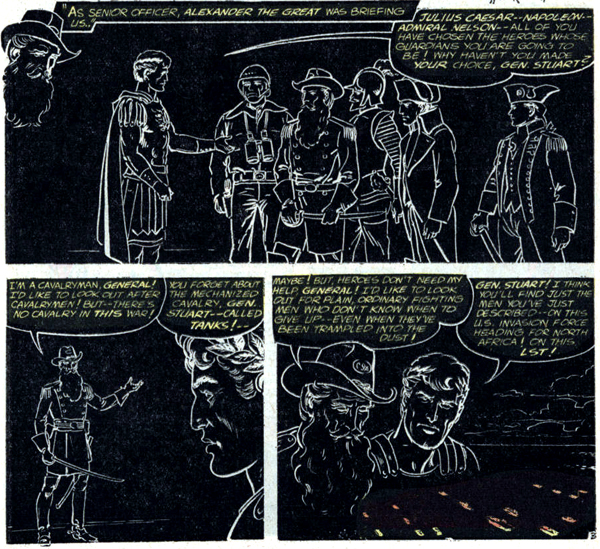
“Battle Origin of the Haunted Tank!” in G.I. Combat #114 (1965), script by Robert Kanigher, art by Russ Heath
And thanks to the noblest Roman of them all, that’s how the ghost of a Confederate Civil War general came to be the guiding spirit for a WWII-era tank brigade in the DC Universe.
Also, Caesar is the one who guided that lightning bolt into Barry Allen’s lab, made Abin Sur’s spaceship crash in the desert, and sent Steve Trevor’s plane to Paradise Island. Despite extensive grilling however, the Gotham City police never managed to pin the shooting of Thomas and Martha Wayne on Caesar.
—
10. Meddling Ghost Caesar from Hell (Jackpot Comics #6)
Here’s another tale spotlighting Caesar as an unworldly guardian of justice, which proves the often-alleged fact that dead spirits from hell are meddling in our worldly affairs. Here, famous real-life historical personages Caesar, Nero, Napoleon and…um, the Three Musketeers…decide to stop World War II. Interesting idea; maybe could have used a little more market research.
Mr. Justice, a Spectre-like hero who can travel the astral planes, is less than enthusiastic about having his bosses replacing him on the job. Particularly when the Three Musketeers screw up an attack on a Nazi castle and get a bunch of civilians killed. Yes, this actually happens in the story. How do you feel about the Three Musketeers and their creamy, light, nougaty candy bar now, kids?
Napoleon takes a more hands-on approach and tries personally to influence Adolf Hitler.
Sadly, the remainder of the comic book is not just panels of Napoleon kissing Hitler.
11. Caesar at War (Frontline Combat #8)
The most ironic and chilling Caesar comic book tale comes, naturally, from one of the finest war comic books of all time, EC’s Frontline Combat. “Caesar!” is created, like the Mad story above, by Kurtzman and Wood. That parody was crowded with elements of humorous effect; this is equally detailed in both serious history and period violence.
Like Caesar’s bloody crusade across Europe, this comic book no picnic. I can picture someone like Thanos getting a giggle or two out of this, but for most level-headed readers, this is pretty powerful and intense stuff.
Any great EC comic, of course, has a bloody ending, “justice is served”-style. Happy Ides of March, kids!
But it’s the final two panels that push this story from merely well-done and brutal adventure history into a chilling commentary on the human race — absolute ice-cold irony from two masters of suspense.
Brr. Excuse me while I recover from the shivers down my spine.
Say, though: what’s this panel in the story?:
One small village of indomitable Gauls still holds out against the invaders? You mean, like these guys (did you spot them up above?) from a panel in Classics Illustrated: Caesar’s Conquests?
Yeah! Who are those guys, anyway?
—
12. These Romans are crazy (Asterix and Cleopatra)
No survey of Julius Caesar in comic books is complete without a long enjoyable look at the Asterix adventures, one of the most beloved European comics series of all time. In these bright and funny stories filled with verbal and visual puns, Gaul fighters Asterix and Obelix, aided by a magic strength potion, fight a never-ending battle against the Roman invaders…and their leader Julius Caesar, who appears in many of the books. Here’s a look at Asterix and Cleopatra, in which the tempestuous Cleo bets Caesar that she can build a great palace comparable to the finest architecture of Rome. In three months.
That’s a feat nigh impossible, unless your Chief Architect smartly enlists super-strong Asterix and Obelix to help with the building.
Caesar sneakily plots to undermine Cleopatra’s likely success by surrounding the city and cutting off supplies.
Moral of the story: Even if you are Julius Caesar, don’t tick off Cleopatra.
In the end all’s well, and Caesar is a noble and gracious loser.
In 2002, Asterix and Cleopatra was made into a fairly faithful French film adaptation, Asterix: Mission Cleopatra. Here’s actor Alain Chabat as our Man of the Day, Caesar:
The movie starred Christian Clavier as Asterix and Gérard Depardieu — yes, the Gérard Depardieu — as Obelix.
It was ostensibly a childrens’ film, but I’m sure dads didn’t have a problem taking their kids to see it since Monica Bellucci played Cleopatra.
(Hello, Google image searchers!)
But what about that most famous of shared comic book canons, the Marvel Universe? Did Julius Caesar ever appear there? Has he teamed-up with the Thing, palled around with Punisher, gone gallivanting with Groot? Well, sure! J.C.’s been in the M.U. quite a few times, but here is surely his most important appearance ever in the 616:
—
13. Vini, Vici, Eram (Captain America vs. Caesar)
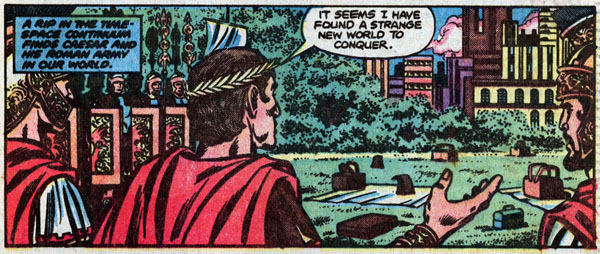
“Captain America and the Time Warp!” (in Marvel Comics cover-dated August 1978), art by Sal Buscema and Joe Sinnott
Courtesy of one of the most convenient narrative shortcuts in the comic book catalogue, a time vortex, Caesar invades Manhattan! Who will stop his ruthless march? Which Marvel hero can face off against an legion of roamin’ Romans?
Why, Captain America, of course, armed with his familiar weapon: moist, golden, cream-filled Twinkies.
Another potential era-spanning war in the Marvel Universe, thankfully averted by Hostess Snack Cakes. Thanks for introducing fat, sugar, and cholesterol to the Roman Empire, Captain America, ya big star-spangled jerk! But I kid, Captain America. Just like I wish all of you, Cap reminds you that you get a big joyride in every Ide of the month of March.
Happy Caesar Murder Day, everyone!
—
MORE
— How I Became a Comics Fan, Thanks to Carmine Infantino’s DARTH VADER. Click here.
— The Ultimate Battle! GODZILLA VS. THE MARVEL UNIVERSE. Click here.

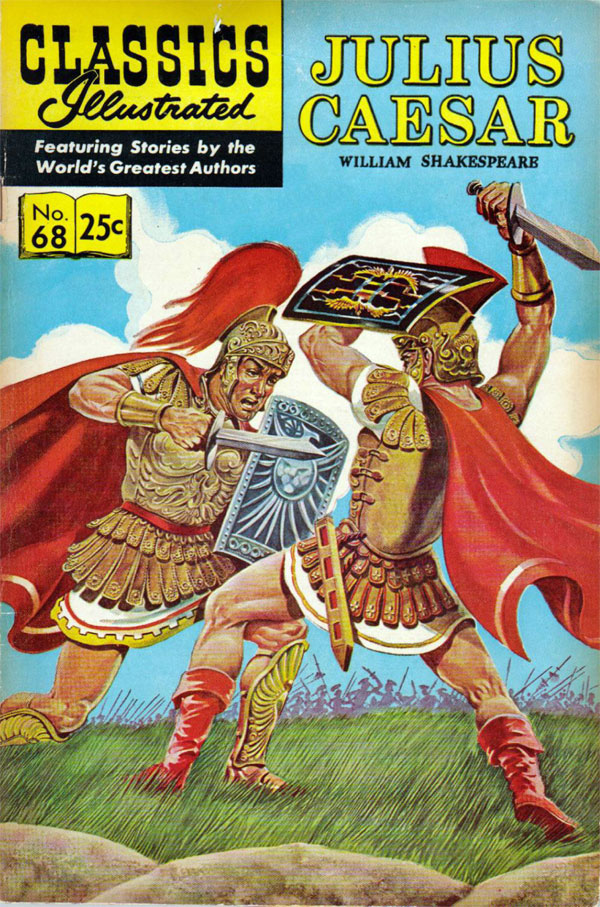

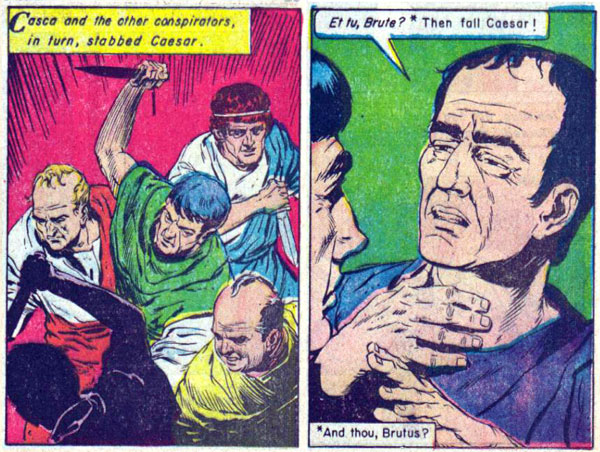
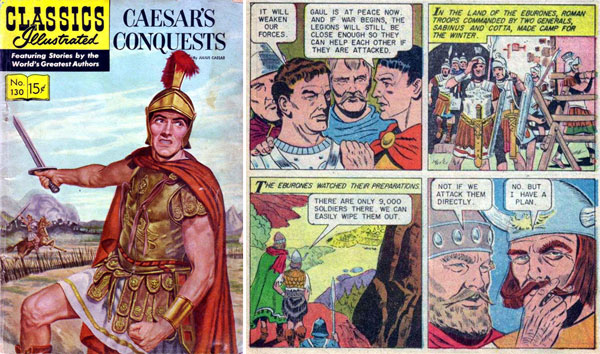

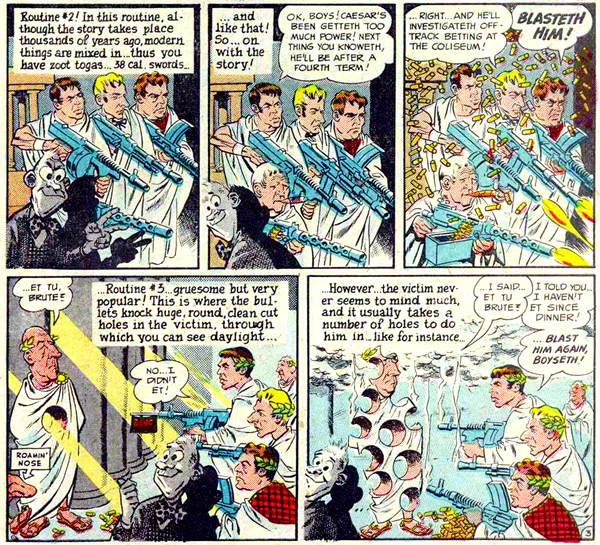
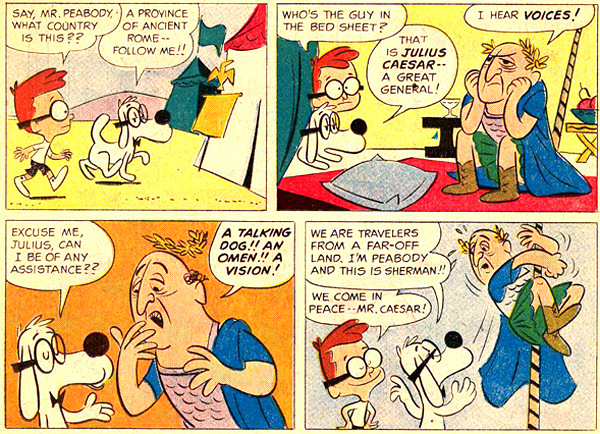
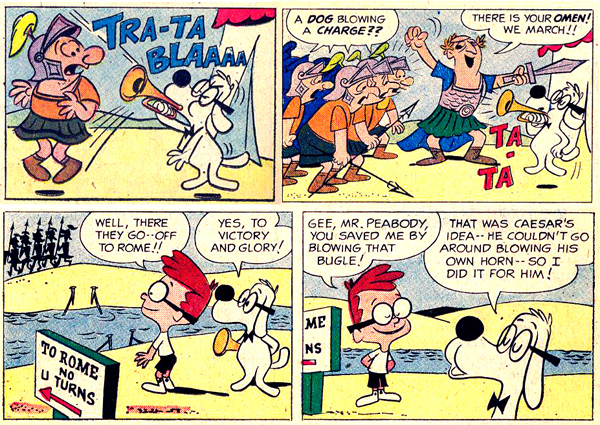

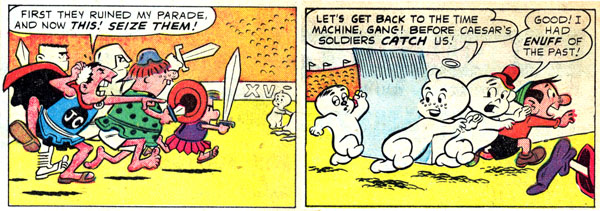
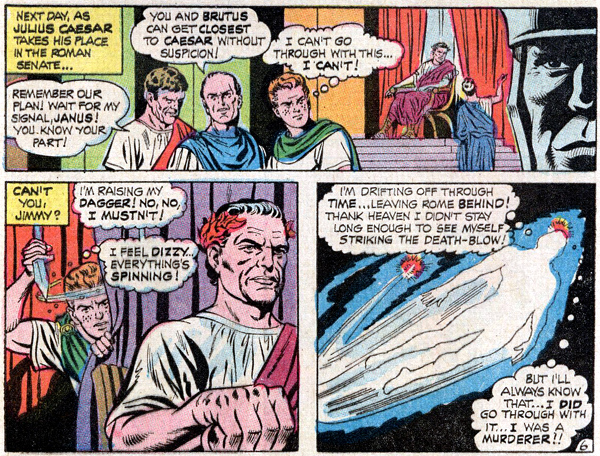
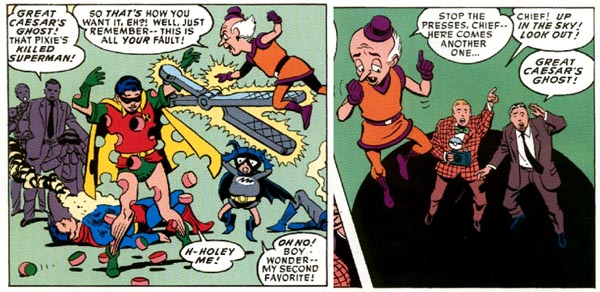
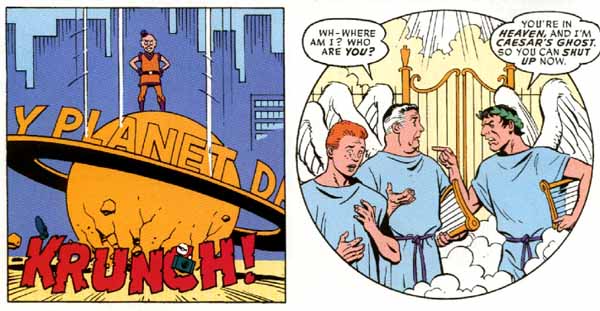
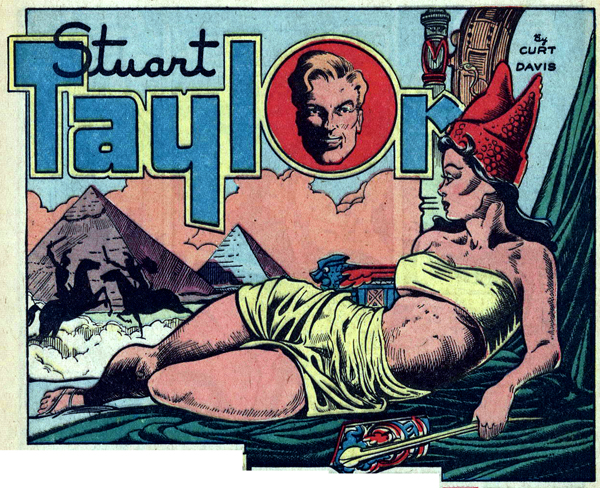
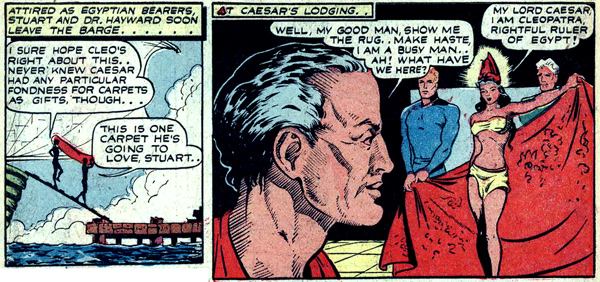
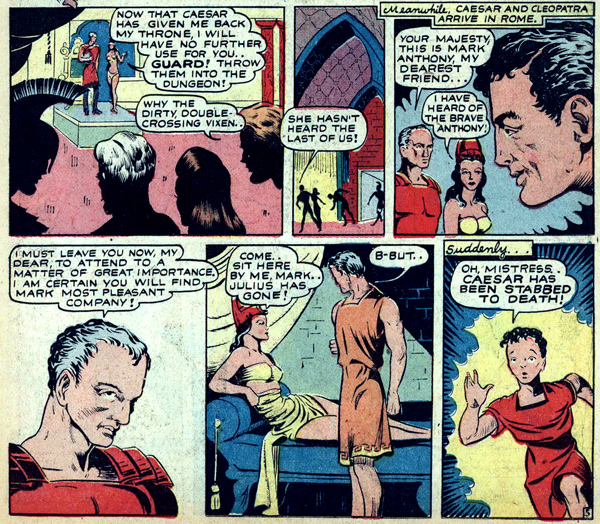
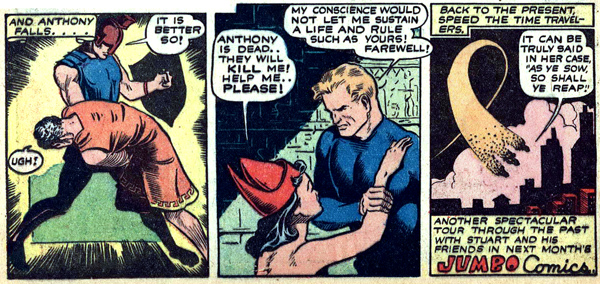
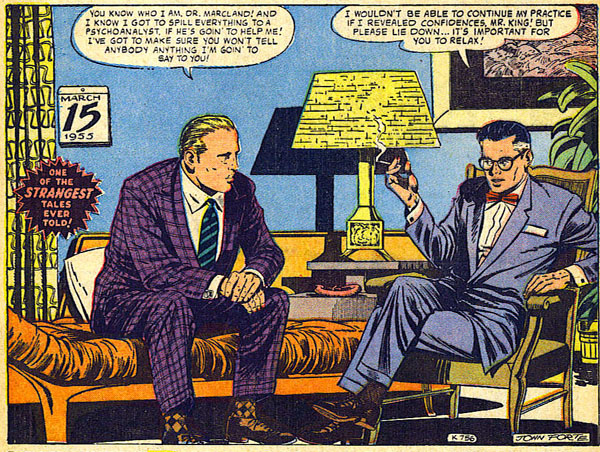
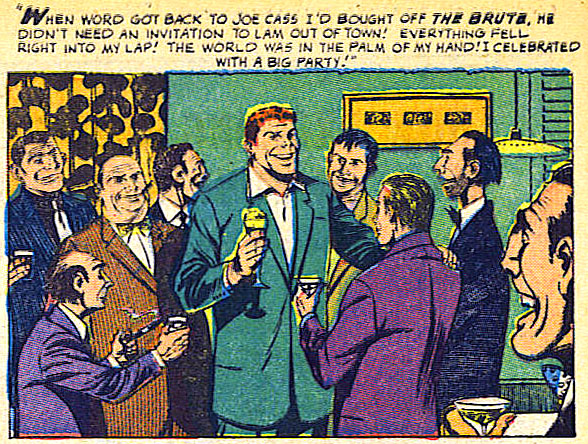
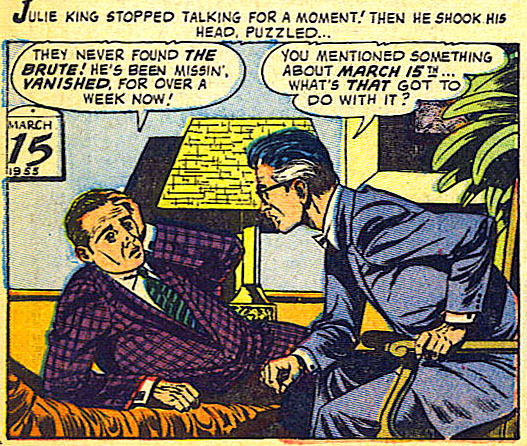
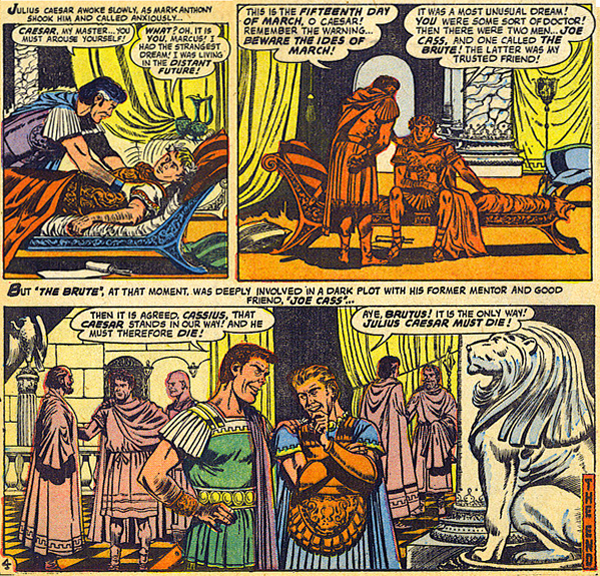
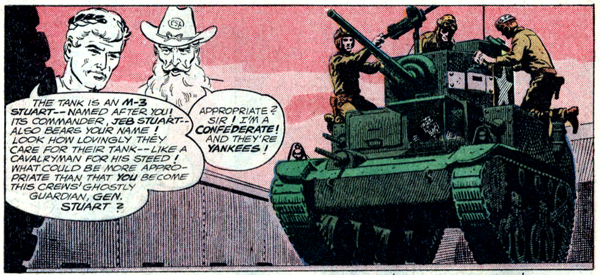
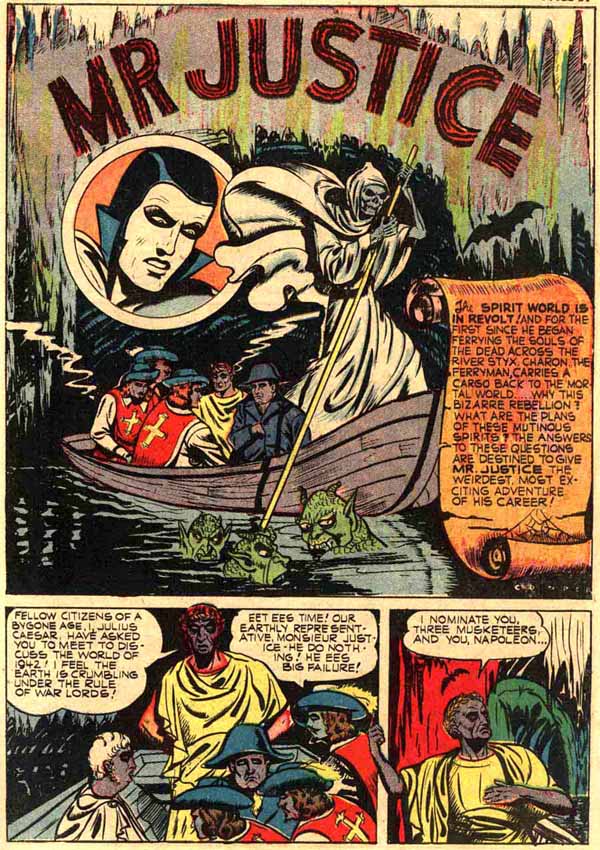
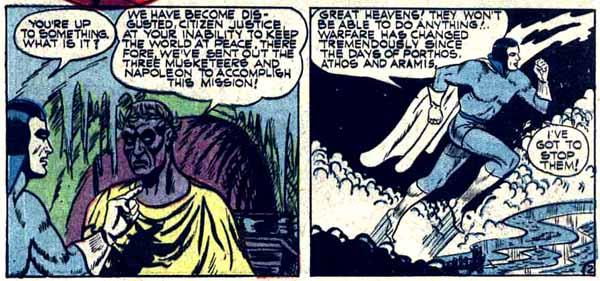
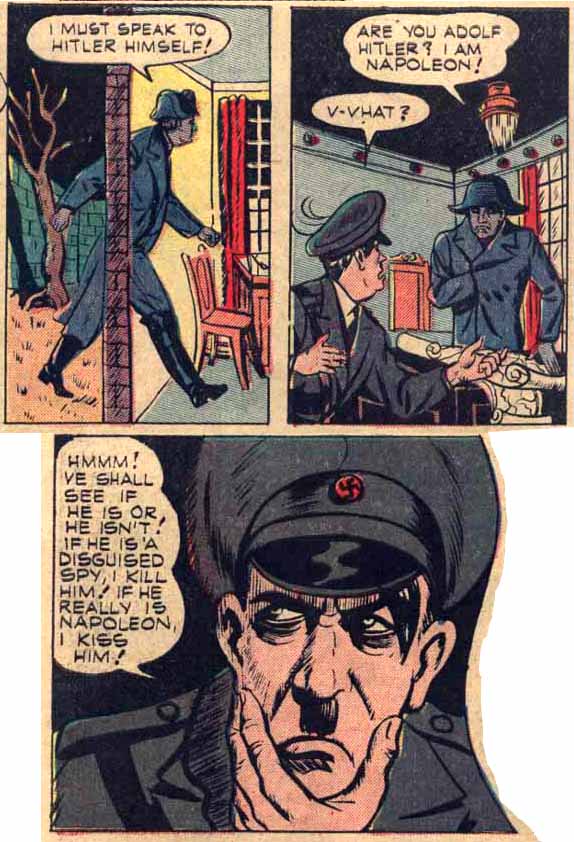
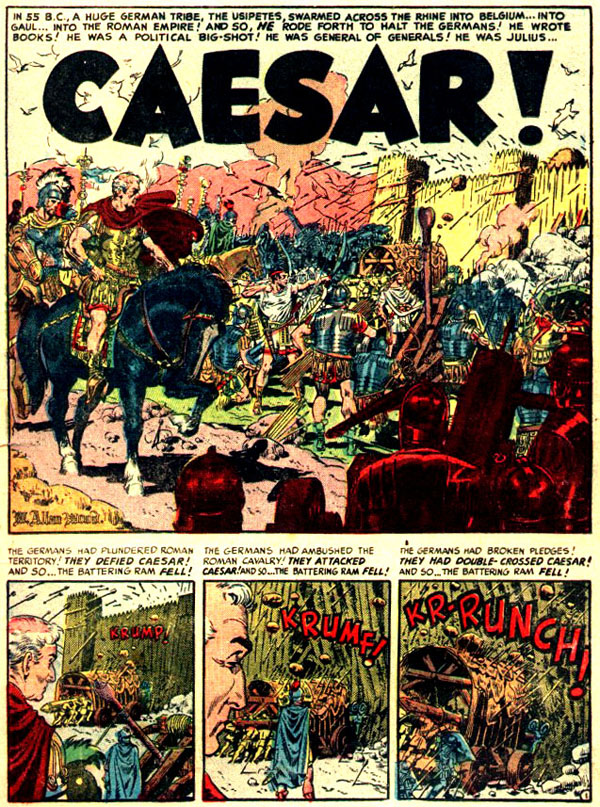
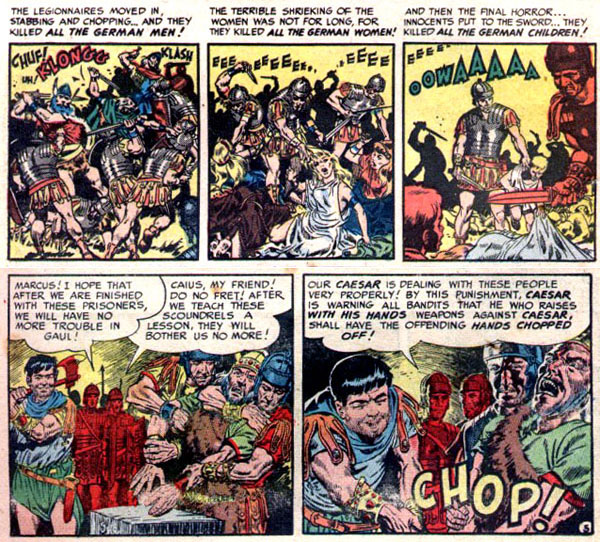
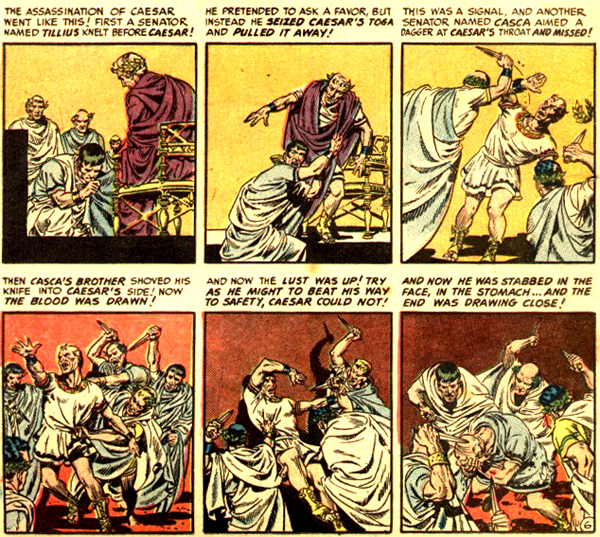
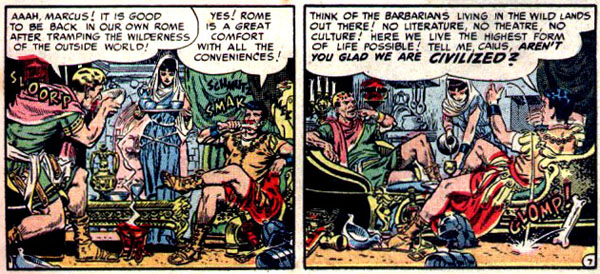
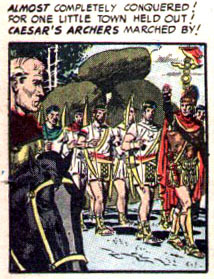
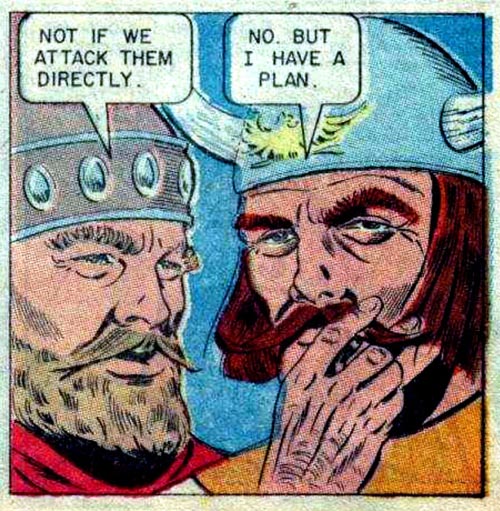
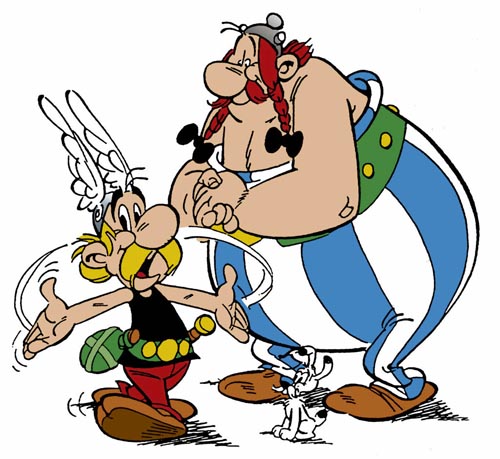
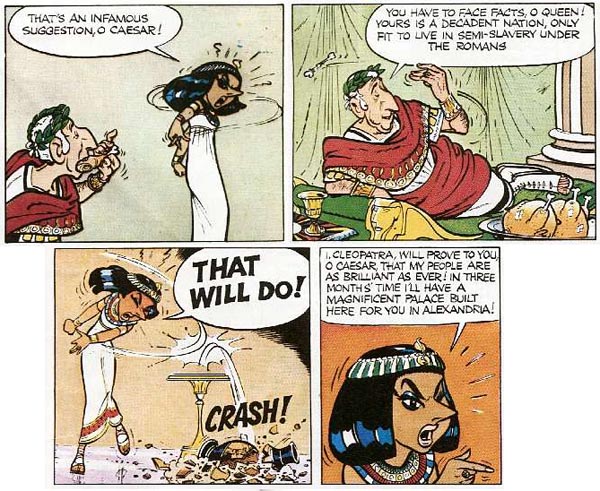

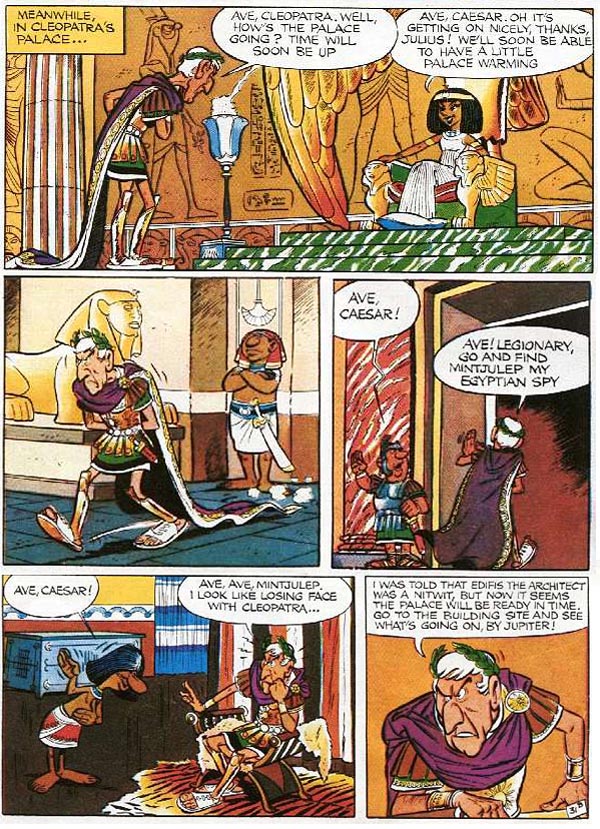

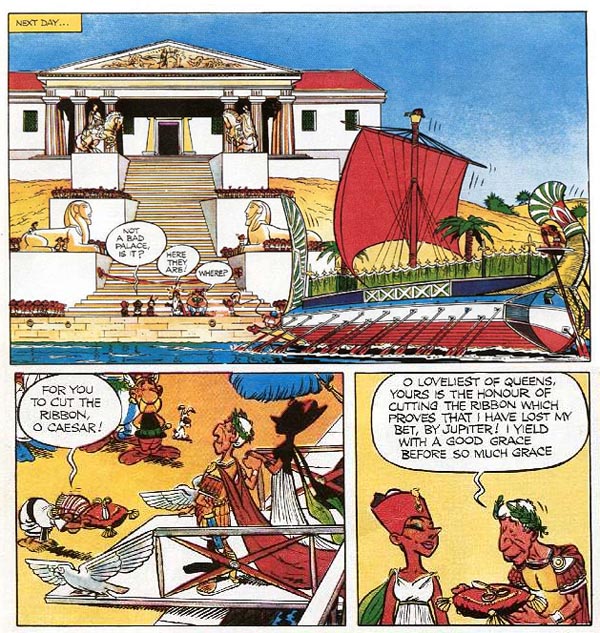
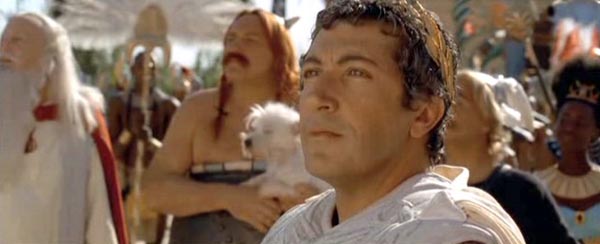


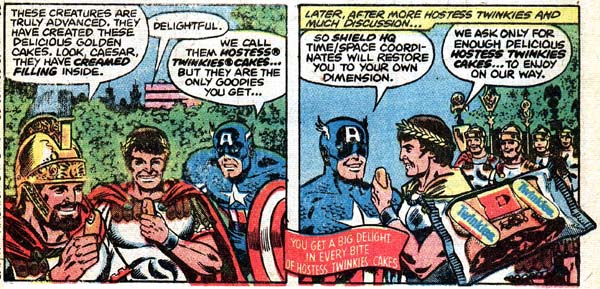
March 17, 2015
Not very chivalrous, that Stuart Taylor fellow!
August 21, 2015
Thank you for a very entertaining piece. I am postgraduate student researching classical elements in comics and graphic novels and have tried searching for the G.I. Combat issue #114 you’ve posted above but unable to get it anywhere. Are there anymore images with Caesar in them in the comic or does it take off with the story of the tank thereafter? If possible, I would be grateful if you could share the comic with me or some more images? Thank you.
March 16, 2023
Brilliant!!! And to think I was just watching my favorite “Carry On” movie the other day, “Carry On Cleo,” with Sidney James as Marc Anthony and Kenneth Williams as Julius Caesar.